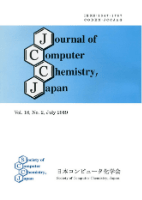
Journal of Computer Chemistry-Japan
Scope & Guideline
Advancing the Frontiers of Computational Chemistry
Introduction
Aims and Scopes
- Computational Chemistry Methods:
The journal publishes research on various computational methods, including quantum chemistry, molecular dynamics, and machine learning, aimed at improving the accuracy and efficiency of chemical simulations. - Material Science and Nanotechnology:
A significant focus area is the study of materials at the molecular level, particularly nanostructures and their properties, including electronic and optical characteristics. - Chemical Education and Visualization:
The journal emphasizes educational aspects of computational chemistry, offering insights into visualization techniques and tools that facilitate the understanding of complex chemical concepts. - Interdisciplinary Applications:
Research that applies computational chemistry to diverse fields such as drug discovery, renewable energy (e.g., solar cells), and environmental chemistry is a core area, promoting the integration of chemistry with other scientific disciplines. - Quantum Molecular Dynamics:
The journal features studies on quantum molecular dynamics, exploring phenomena such as photoisomerization and protein folding, which are crucial for understanding biological processes at a molecular level.
Trending and Emerging
- Machine Learning in Chemistry:
There is a significant rise in papers integrating machine learning techniques into computational chemistry, reflecting the growing importance of data-driven approaches to predict chemical behavior and properties. - Quantum Computing Applications:
Research exploring the applications of quantum computing in chemical simulations is gaining traction, showcasing the potential of quantum technologies to revolutionize computational chemistry. - Sustainable Energy Solutions:
The journal has seen an increase in studies focused on sustainable energy, particularly in the development and optimization of materials for solar cells and fuel cells, highlighting a commitment to addressing global energy challenges. - Complex Biological Systems:
Emerging themes include the simulation and modeling of complex biological systems, such as protein folding and interactions, which are critical for understanding biochemical processes and drug interactions. - Interdisciplinary Research Initiatives:
There is a growing trend towards interdisciplinary research that combines computational chemistry with fields like materials science, biology, and environmental science, fostering a holistic approach to solving complex scientific problems.
Declining or Waning
- Traditional Computational Techniques:
There has been a noticeable decrease in the publication of papers focusing solely on traditional computational techniques without the integration of newer methodologies like machine learning or advanced simulation techniques. - General Chemical Theory:
Papers discussing general chemical theories or principles without a computational framework have seen a decline, indicating a trend towards more application-driven research. - Basic Visualization Approaches:
While visualization remains important, the basic approaches to visualizing molecular structures and properties are becoming less frequent, as researchers seek more advanced and interactive visualization tools. - Conventional Drug Discovery Methods:
Traditional drug discovery methods that do not incorporate computational or machine learning approaches are less frequently covered, reflecting a shift towards more innovative and efficient methodologies. - Static Models of Chemical Systems:
Research focused on static or equilibrium models of chemical systems has decreased, with a growing preference for dynamic and time-dependent studies that reflect real-world chemical behavior.
Similar Journals

JACS Au
Driving discovery in analytical and theoretical chemistry.JACS Au, published by the American Chemical Society, is a premier open access journal dedicated to advancing research in the rapidly evolving fields of analytical chemistry, organic chemistry, and theoretical chemistry. Since its inception in 2021, JACS Au has quickly established itself as a leading platform for high-quality research, reflected in its Q1 rankings across multiple categories for 2023, including Organic Chemistry and Analytical Chemistry. The journal focuses on innovative methodologies and applications that drive the discipline forward, making it an essential resource for researchers, professionals, and students alike. With an impressive Scopus ranking, consistently placing in the top tiers of its categories, and offering a broad range of access options for its readership, JACS Au aims to foster collaboration and disseminate transformative ideas that impact the global scientific community. Exploring diverse topics within chemistry, this journal provides a vital conduit for sharing groundbreaking research and enhancing scientific dialogue.

Annual Review of Physical Chemistry
Advancing the Frontiers of Physical ChemistryAnnual Review of Physical Chemistry, published by Annual Reviews, stands as a premier source of comprehensive review articles in the field of physical chemistry. With a prestigious impact factor and a strong reputation reflected in its Q1 rankings in both Physical and Theoretical Chemistry and Medicine (Miscellaneous), this journal is essential for researchers seeking to stay at the forefront of advancements in the discipline. Covering a wide array of topics, the Annual Review of Physical Chemistry synthesizes the latest findings, trends, and methodologies, providing a vital resource for professionals and students alike. Although it does not offer open access, its scholarly rigor and in-depth analyses ensure it occupies a critical space in academia. Its consistent publication since 1975 guarantees that it has historical significance and relevance, making it a cornerstone for those engaged in cutting-edge research within the realm of physical chemistry.

JOURNAL OF MATHEMATICAL CHEMISTRY
Pioneering Research at the Nexus of Math and ChemistryJOURNAL OF MATHEMATICAL CHEMISTRY is a prominent peer-reviewed journal published by Springer, dedicated to the field of mathematical chemistry. With an established history dating back to 1987, this journal serves as a vital platform for researchers to disseminate innovative findings and methodologies that combine the principles of mathematics with chemical science. Currently, it holds a commendable impact factor and ranks in the Q2 category for both applied mathematics and miscellaneous chemistry in 2023, showcasing its influence within these disciplines. The journal is indexed under Scopus, with notable rankings that place it in the top quartile among related works, ensuring high visibility and academic rigor. While access to its content is not open, the journal maintains a dedicated readership of professionals, researchers, and students eager to explore the computational and theoretical aspects of chemistry. The JOURNAL OF MATHEMATICAL CHEMISTRY continues to enrich the scientific community by fostering interdisciplinary collaboration and advancing quantitative approaches in chemical research.

JOURNAL OF THE INDIAN CHEMICAL SOCIETY
Empowering Chemists through High-Quality ResearchJournal of the Indian Chemical Society, published by Elsevier, stands as a cornerstone in the field of chemistry, particularly representing the rich chemical research emanating from India.
With a significant history dating back to its establishment, this journal encompasses diverse disciplines including Drug Discovery, Electrochemistry, Inorganic Chemistry, Organic Chemistry, and Physical and Theoretical Chemistry, reflecting the evolving landscape of chemical sciences.
Despite being positioned in the Q3 category across multiple quarters, the journal demonstrates promising rankings in various chemistries, highlighting its commitment to advancing the knowledge and application of chemical sciences. While currently not available as an open access journal, the Journal of the Indian Chemical Society is dedicated to providing a platform for high-quality research that fosters innovation and collaboration among researchers, professionals, and students worldwide.
With its continuous publication from 1973 to the present, it serves as an essential repository for cutting-edge findings and developments in chemistry, striving to connect academia with industry and practice.
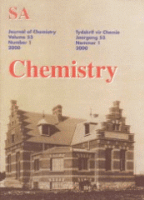
SOUTH AFRICAN JOURNAL OF CHEMISTRY-SUID-AFRIKAANSE TYDSKRIF VIR CHEMIE
Unleashing Potential: Chemistry Without BarriersSouth African Journal of Chemistry (Suid-Afrikaanse Tydskrif vir Chemie), published by Bureau Scientific Publications, is a pivotal open-access journal that has been disseminating groundbreaking research in the field of chemistry since its inception in 1996. With an ISSN of 0379-4350 and an E-ISSN of 1996-840X, this journal serves as a vital platform for researchers and professionals seeking to share their work and engage with the global chemistry community. Recognized for its significant contributions, the journal holds a Q3 quartile ranking in the miscellaneous chemistry category as of 2023 and ranks #216 out of 408 in General Chemistry according to Scopus. The South African Journal of Chemistry is dedicated to advancing knowledge in the discipline by publishing a wide array of articles, reviews, and studies that address pertinent chemical research and applications. With open access options available since 2000, it fosters a collaborative environment, ensuring that research is accessible to all, thereby enhancing the visibility and impact of chemists' work across South Africa and beyond.
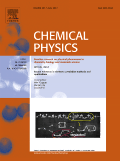
CHEMICAL PHYSICS
Unveiling Chemical Phenomena Through Innovative Research.CHEMICAL PHYSICS is a premier international journal published by Elsevier, dedicated to advancing the field of theoretical and experimental chemistry, particularly within the physical domain. Since its inception in 1973, this journal has served as a platform for disseminating cutting-edge research, fostering collaboration among researchers and professionals in the community. With a notable impact factor and recognized in the Scopus rankings, CHEMICAL PHYSICS holds esteemed positions in two categories: Q3 in Physical and Theoretical Chemistry and Q2 in Physics and Astronomy (miscellaneous). Published in the Netherlands, the journal features high-quality articles that cover a broad spectrum of topics, aiming to deepen understanding of chemical phenomena through innovative approaches. Although open access options are not currently available, the journal remains invaluable for researchers, students, and professionals seeking to stay informed about the latest developments in chemical physics. With convergence years extending from 1973 to 2025, CHEMICAL PHYSICS continues to be a significant contributor to the academic discourse in its field.
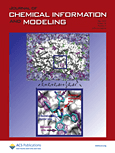
Journal of Chemical Information and Modeling
Connecting Chemistry and Technology for Tomorrow's Solutions.Journal of Chemical Information and Modeling is a premier scholarly publication dedicated to advancing the fields of chemical engineering, chemistry, and computer science applications. Published by the reputable American Chemical Society, this journal significantly contributes to the scientific community through innovative research and critical reviews that facilitate the understanding and application of chemical information. With an impressive impact factor and a distinguished ranking in multiple categories—such as Q1 in Chemical Engineering and Q1 in Chemistry—the journal is an indispensable resource for researchers and professionals alike. As open access is not currently available, the journal preserves a selective distribution model that ensures high-quality content is accessible to a dedicated audience. By exploring the intersections of data science and chemical informatics, the Journal of Chemical Information and Modeling fosters interdisciplinary collaboration and innovation, positioning itself as a leader in its field. Researchers, professionals, and students are encouraged to engage with this influential platform for the latest developments in chemical information science.
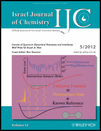
ISRAEL JOURNAL OF CHEMISTRY
Connecting Researchers with Cutting-Edge FindingsIsrael Journal of Chemistry is a leading international journal published by Wiley-VCH Verlag GmbH, dedicated to advancing the field of chemistry through high-quality research publications. With an impressive Q1 ranking in the Chemistry (Miscellaneous) category of the 2023 Scopus rankings and a solid percentile standing of 73rd, this journal plays a vital role in disseminating significant findings to a global audience. Established in 1963, it has maintained a legacy of excellence in chemistry until 2024, covering a wide range of topics including organic, inorganic, physical, and analytical chemistry. While not offering open access, the journal remains a crucial resource for researchers, professionals, and students seeking to enhance their knowledge and contribute to the field. With its rigorous peer-review process and commitment to scientific integrity, the Israel Journal of Chemistry continues to be a beacon of innovation and scholarship in the ever-evolving landscape of chemical research.
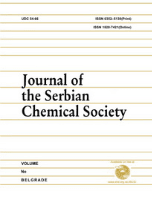
JOURNAL OF THE SERBIAN CHEMICAL SOCIETY
Exploring the Frontiers of Chemistry TogetherJOURNAL OF THE SERBIAN CHEMICAL SOCIETY, an esteemed publication in the field of chemistry, is published by the SERBIAN CHEMICAL SOCIETY and has been an essential platform for the dissemination of research since 1930. With an ISSN of 0352-5139, this Open Access journal is dedicated to fostering communication and collaboration among chemists worldwide, making its contents readily accessible to researchers, professionals, and students alike. Based in Serbia, the journal features a wide range of topics within the domain of general chemistry, as reflected in its Scopus rankings, which place it in the 34th percentile among its peers. The journal's engagement with the global scholarly community is further underscored by its consistent publication history since 1985, with coverage extending through to 2024. As the journal continues to evolve, it remains committed to promoting high-quality research and advancing the field of chemistry.

ACTA CHIMICA SLOVENICA
Your Gateway to Cutting-Edge Chemical ResearchACTA CHIMICA SLOVENICA is a distinguished peer-reviewed journal dedicated to advancing the field of chemistry, published by the SLOVENSKO KEMIJSKO DRUSTVO. With an ISSN of 1318-0207 and E-ISSN 1580-3155, this journal has been an essential resource for researchers and professionals since its inception in 1996. Recognized for its commitment to open access since 1998, it fosters global collaboration by making research widely available. Based in Slovenia, the journal operates with a focus on various domains within chemistry, achieving a respectable Q3 ranking in 2023 within the miscellaneous chemistry category on Scopus, showcasing its impact and relevance. This journal serves as a vital platform for innovative research, reviews, and discoveries, aiming to enhance knowledge and ignite curiosity in a diverse readership, including students and emerging scholars in the field.